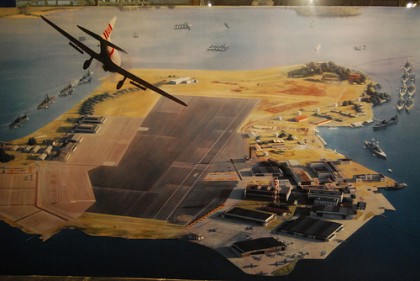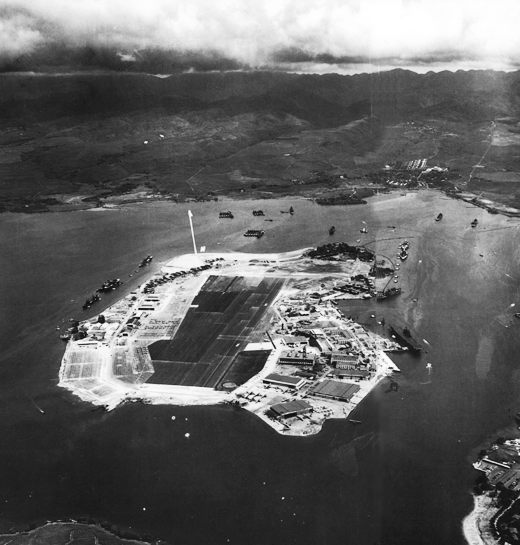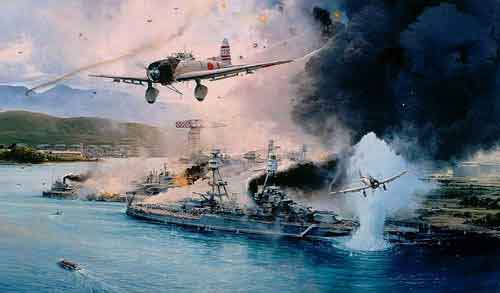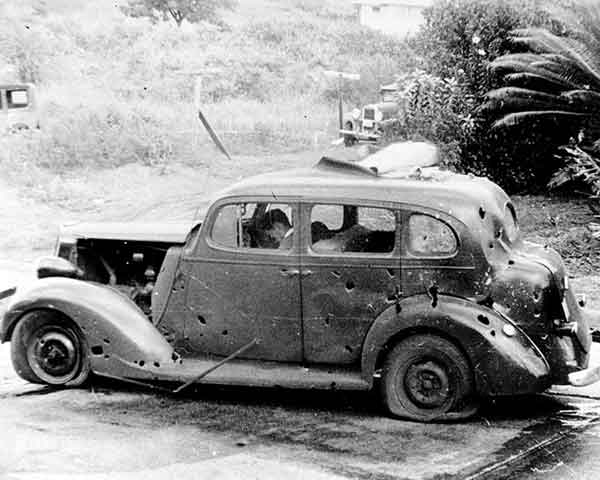Remember Pearl Harbor

(Pearl Harbor, 0755…While the Giant Slept. Image copyright Dru Blair.)
You know what day it is. National Public Radio played a few bars from the old song that advises us to remember before they got on with some wild assertions from the President of the World Bank, Dr. James Kim, and analysis of the Right to Work legislation in Blue Michigan, which seems to have a Red government.
I am going to defer on both issues in honor of the day. I think about living on the shores of Pearl Harbor, and the men and women who were serving there on The Day. Mac made them come alive to me: Eddie Layton, and Joe Rochefort and Tommy Dyer and Jasper Holmes. And a step removed from the men he worked with, poor Husband Kimmel and Lt. Gen Walter Short, who both took the fall for the colossal series of mistakes that made the surprise attack possible and devastating.
The Macaroon Lady on the Left Coast is till fighting a rear guard action to reveal the cover-up about who knew what on this day 71 years ago. I wish her well on her quest. I would like to see the record set straight.
I used to make a point of talking to Mac on Pearl Harbor Day, or at least getting him a note of remembrance. With the proximity of his passing over to the other shore to join his shipmates, this is an especially poignant anniversary. He was not one of the increasingly small number of Survivors, since he arrived by boat from the Mainland several weeks after the attacks.
In February, 1942, the wreckage was still new, and the prospects of the fight were ominous.
His first vision of Pearl was of the shipyard workers swarming over the beached hull of USS Nevada at Hospital Point. The rest of the great ships were still sunk in the mud of the harbor, and the eerie sight of the bottom of the great hull of Oklahoma alongside her berth.
The image above is a reproduction of artist Dru Blair’s vision of the moment Lieutenant Commander Takahashi Kakuichi’s Aichi D3A1 Type 99 “Val” Dive bomber rolls in on Hangar 6 on the southern tip of Ford Island. By accident, Takahashi was the first to drop his ordnance because of a mistake in interpreting the signal flares beginning the attack. Takahashi’s bomb struck the water’s edge in front of hangar 6 located at 5 o’clock in this picture.
Let’s get oriented. The Army side of the Ford Island flight line is to the left.
We worked in the headquarters building two structures counter-clockwise from the first bomb hit. We jogged around the island, sometimes twice, for physical training at lunch. Wreckage from the salvage operations still littered the shore, including bits of ancient steel cable used to right the capsized USS Oklahoma were on the shore. USS Utah is still at the berth where she was sunk, as is Arizona, under her graceful white inverted arch. Both ships are still afloat in this image, for a few moments more.
The Pacific Aviation Museum is now housed in the former seaplane hangars. USS Missouri, where the war ended, is now berthed ahead of the hulk of Arizona, representing the Alpha and Omega of the great struggle.
McGrew Point is just to the right center of the top margin of the painting. We lived at 121 McGrew Loop and our view from the lanai looked right down Battleship Row.
Blair’s painting is often described as one of the most accurate representations of how things looked that morning as we transitioned from peace to war. My copy of this print is signed by the artist and numbers 847 of a print run of 1941.
I heard the artist got a helicopter to take him to the exact spot on this day at exactly 0755 so he could get the shadows just right.

(An aerial view of Ford Island, taken from nearly the same vantage as Blair’s painting in October of 1941. Note the carrier pier side to the right center. Thank God the flat-tops were at sea that morning and escaped harm. There is currently a plan by the Navy to place an enormous solar panel farm on the old runway, surrounded by a seven-foot fence. If you think that this is sacrilegious, you would be right. Sign the petition at Change.Org if you agree. Photo USN.)
http://www.change.org/petitions/remember-pearl-harbor-save-historic-ford-island-runway

(Famed aviation artist Robert Taylor created this image of the second wave of the attack. Image copyright Robert Taylor).
A little after an hour after the first bomb fell, USS Nevada had slipped her moorings and proceeded down the channel to Hospital Point, where she (fortunately) was beached. Had she been caught exiting the channel by the second wave of the attack, she would have gone down in hundreds of fathoms of water. As it was, she was re-floated and fought her way across the Pacific to join the occupation Fleet in Tokyo Bay.

(Civilian casualty of the Japanese attack. Photo USN).
I had hoped for a quiet day today for some contemplation and organization, but it does not look like it is going to happen. The above picture is one I had not seen before. It makes you pretty grateful for the sacrifice of Mac’s generation. It enables us to drive to work without confronting the Empire of Japan.
Copyright 2012 Vic Socotra
www.vicsocotra.com
